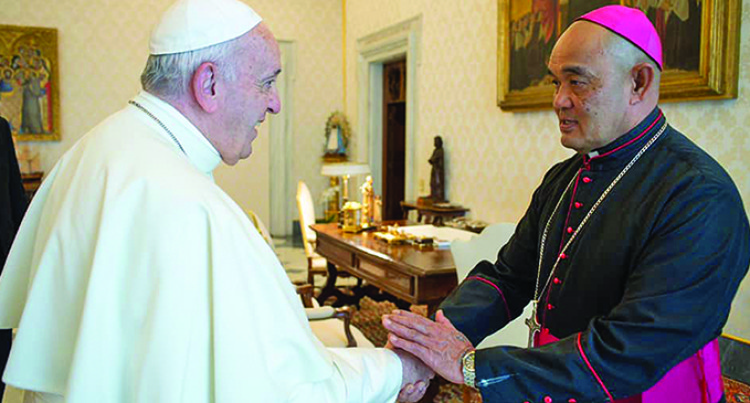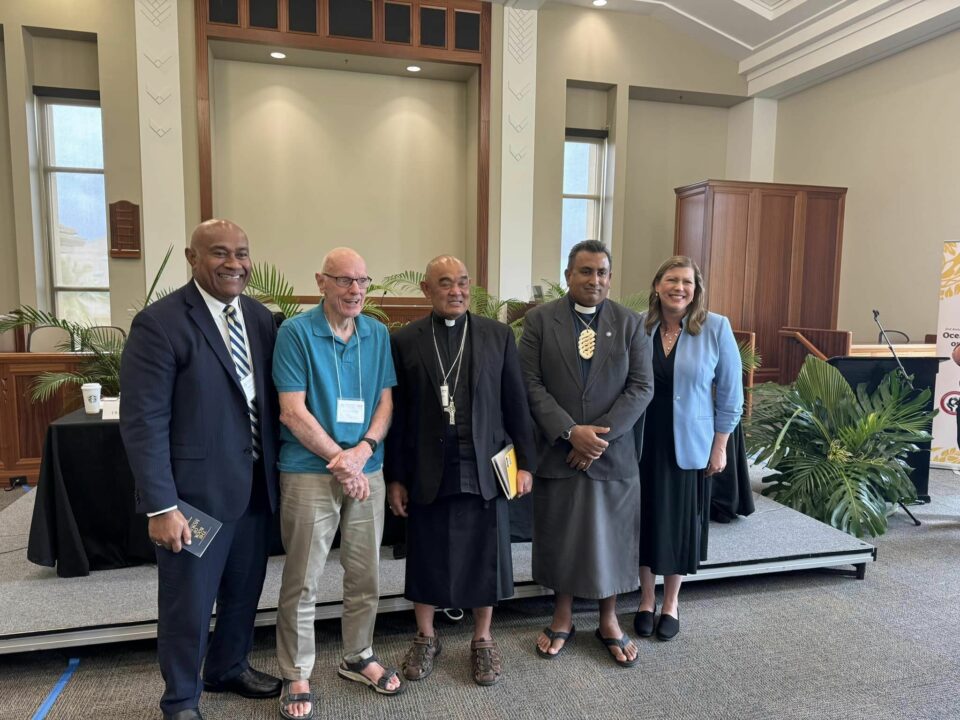The Present: Globalization as Neo-colonialism
0n 10th October, Fiji celebrates her 50th Independence anniversary. Independence from British colonial rule and its particular form of power – labelled by many writers as ‘patron-client politics’; a form of power that has flowed into the independence era till today. However, today we are faced with a new form of colonialism, a neo-colonialism – globalization. Globalization is the new form of political domination.
African say: ‘We have become independent, but not democratic.’
Therefore, any Fijian political party or government hoping to bring about integral political and economic development must address the power of globalization.
What is Globalization?
Globalization is a complex issue that can be defined in many ways depending on the discipline from which one studies it.
Jan Nederveen Pieterse: globalization is being shaped by technological changes, involves the reconfiguration of states, extends regionalization, and is uneven. Another commonly recognized consequence of globalization is that it produces time-space compression–more intensive interactions across wider space and in shorter time than before.
A thread that runs through all globalization discourses is increasing connectivity. The boom of information and communications technologies (ICT) forms part of the infrastructure of globalization in finance, capital mobility and export-oriented business activity, transnational communication, migration, travel, and civil society interactions.
The world has become so intensely interconnected in its actions that it is difficult to set boundaries between territories. Increasingly, what happens economically, politically, and socially in a country will significantly influence other countries and their citizens, a trend that has been intensified by modern innovations in transportation, communication and technology. With this worldwide movement, the boundaries that define the local have broken down. In a globalizing world, we see more interconnectedness, where boundaries are erased, and homogeneous culture is created. People, money, and products move around the world with ease, intensity, and at a high velocity, bringing dramatic cultural changes. Many writers on globalization declare that the world has shrunk into a highly interconnected village.
Another way of defining globalization is in terms of culture. Globalization brings about a culture based on the market. It focuses on making profit at the expense of human beings and nature. It privileges the power of multinational corporations, which now have dominion over the world in terms of exploitation, production, markets, and political and economic policies. It is their power and influence that have caused the extensity, intensity, and velocity of so many things to increase as they are moved and used around the world. Multinational corporations truly rule the world today. They influence the world with their market-oriented culture, which promotes capitalism, consumerism, and individualism. In the final analysis, the globalized culture serves the corporations rather than people.
Michael Amaladoss: The market seizes on whatever opportunity there is to make profit, thereby reducing human beings to a means of production and a commodity. Globalization promotes a culture that serves the interests of corporations and the rich and continues to make the poor even poorer.
Historical Development of Globalization
Several factors have contributed to the high development in technology, communication, and transportation that have brought about this phenomenon that we call globalization. Globalization can be seen as emerging from the economic crisis after the Second World War. Faced with the depression resulting from the Second World War, the economic powers tried to create a way forward in terms of economic development. In July, 1944, the world’s leading economic players, economists, politicians, bankers, and prominent representatives of corporations met in Bretton Woods, New Hampshire, to map out the future of economic development. They concluded that to avoid another worldwide depression, a global corporation would need to be formed and new bureaucracies and new rules of free trade would have to be designed to support this. This Bretton Woods meeting gave birth to globalization and the institutions that would become instrumental in promoting its vision, in particular the World Bank (originally called the International Bank of Reconstruction and Development) and the International Monetary Fund.
Globalization engineered a vision of economic development that has brought about a rapid shift in the world, a reordering marked by fast communication, transport, and high technology. Today, WB and IMF are the superpowers controlling economics and politics throughout the world. They have taken over the sovereign authority states have traditionally held over their domains, by breaking national, cultural, and geographic boundaries directing the world toward becoming a single homogenous society, a global village. In fact, many governments are forced to serve the multinational corporations rather than the people that elected them. Globalization brings about economic development that by design serves corporations and their accumulation of capital. It measures economic development in terms of profits and monetary wealth and argues that these will help alleviate poverty.
When Corporations Rule the World, by David Korten, illustrates this situation well:
He sees it as an attempt to integrate the world’s mega-corporations into a single borderless global economy in which the world’s mega-corporations are free to move goods and money anywhere in the world that affords an opportunity for profit, without governmental interference. In the name of increased efficiency, the alliance seeks to privatize public services.
Globalization robs nations of their resources through free trade and also robbing families and local-indigenous communities of their livelihood.
To accomplish their vision, the Bretton Woods institutions rely on a strategy solely based in economic development. For them, development is synonymous with economic growth. Economic growth depends of investment. So, poor countries who have little to invest, foreign borrowing seems to be their only hope of development. Globalization’s proponents argue that with more foreign borrowing, there will be rapid growth and faster development.
The market is the root metaphor for the economic system. The development paradigm for these institutions is – more profits equals economic development. To facilitate economic growth, their policies supported development of new economic systems that have full and free control over resources, production, and trade. Therefore, resources have to be freed up and freedoms in marketing and trade have to be guaranteed by nations. However, countries that need development have to adjust to these criteria and accommodate foreign investors as much as possible. This means deregulation–eliminating laws that would in any way hinder the economic activities of corporations. Unfortunately, in many cases this means relaxing laws that protect human dignity, nature, the environment, and the community as a whole. Corporations demand total freedom for their economic activities, so much so that they displace the government in terms of decision-making and setting policies for development. They become the sovereign power and decision-maker. The corporations and supporters of foreign investment have always argued that, in the end, profits will be shared with governments and communities and help alleviate poverty. However, this argument has not always proven true.
Some Features of Globalization
Multinational corporations use privatization and commodification to take full control of resources. This strategy involves privatizing essential services, water, beaches, natural environment, genetic structures of bodies and indigenous seeds, and other community services that previously, the government would have run. But privatization, introduced in the name of efficiency, has assumed the government’s role. This becomes a dangerous trend when it is extended to some elements that have always been assumed to be for the common good of all humanity; once they become commodified, the needs of the people are forgotten.
This encourages national economies to be more export-oriented rather than domestic-market oriented. Incentives are given to attract foreign investors, such as extended tax holidays and relaxation of labor laws. This strategy is basically to develop foreign corporations rather than self-reliant local projects. It leaves a national economy reliant on foreign investors rather than developing local economic development that serves its people; the export-oriented strategy does not encourage local, self-reliant projects because they might well become a hindrance or even a competitor to the monopoly of foreign corporations. Therefore, through the export-oriented policy, small nations become the victims of the domination and manipulation of corporations and the model established by the Bretton Woods institutions.
A characteristic of globalization in Fiji is the power of multinational corporations over the government. Corporations are powerful and do not recognize any border. As Held and McGrew write, a multinational corporation “defines a borderless economy in which the power of governments to manage the national economy is being eroded.” This is especially true for Third World countries like Fiji that do not have the resources to stand autonomously in terms of economic development. They become easy victims of the domination of multinational corporations. Local governments are often advised by the Bretton Woods institutions that if they are to benefit from IMF and WB policies, they need to abide by the institution’s structural adjustment programs. Local governments are to allow for the free activity of corporations and free up resources for exploitation. This makes the local governments servants of the multinational corporations rather than the people that elected them. This is obvious in how the Fijian government is obliged to offer the hotel industry and garment factories incentives and tax concessions while it increases the value-added tax on people to pay off its loans. The government is seen to be helping the rich get richer and making the poor to get poorer.
We have become independent but no democratic!
Nation states have not disappeared but they now operate within a different context. Multination corporations’ rule. Loss of sovereignty. States retain power, yet they must wield that power in collaboration with other nations and non-state actors.
Catholic Social Teaching and Globalization
Pope Paul VI, Octogesima adveniens: identify participation and equality as fundamental aspirations that are two forms of human dignity and freedom. Pope Paul: There is a basic drive in human beings as they seek greater development to share responsibility in decision making that shape their individual and collective future.
Globalization suffers from a ‘democratic deficit’. Globalization has two fault-lines in decision making:
In sum, democratic deficit of globalization is that large numbers of world’s peoples are without effective means of participating in a meaningful way in decisions that will directly bear on their well-being.
Subsidiarity calls for keeping capacities to assess, decide, and act at the most local level possible while still being effective in securing the common good. We do not want a ‘nanny’ form of government.
In globalization, Nation states have not disappeared but they now operate within a different context. States retain power, but they must wield that power in collaboration with other nations and non-state actors. Multination corporations’ rule.
Globalization has taken away some oversight from nations and place economic actors in a more depoliticized global space. Regulation must be put into place to avoid the negative impacts of the free-market capitalism.
What is needed is:
Fundamental Questions of CST
Call for New World Order: Another World is Possible
John Paul II
Pope Benedict
Papal Calls
What is needed is a new political globalization that matches, counters, humanizes economic globalization.
What is required is openness to new institutions and procedures.
The Role of the Church
It is not the Church’s role to replace the state and politics. Neither is it the Church’s role to make policies; rather, the Church seeks to inspire the state and, in particular, its political institutions with the beauty and goodness of Catholic Social Teaching in order to bring about a more just society.
Social doctrine of the Catholic Church has two purposes:
The Church wants to build a just society and it seeks to do so on the solid foundation of four fundamental values: Truth, Freedom, Justice and Love.
The Way Forward
Corvid19 has done what human cannot do, that is, slow down globalization and reverse the world. Codiv19 has given space for people to reset fundamental life-giving principles. Cordiv19 will challenge policy makers to reflect on development that places the human person at the center, promotes local participation and benefit and regulate the businesses of global corporations. Codiv19 challenges the world on how we want to chart this world so that it will protect human beings and creation.
Story of meeting a political campaigner San Damiano.
Please do not lie!
I congratulate the NPF Party for reaching a milestone on your 50th Anniversary. You are the oldest party – this is testimony to a well-established vision and unity.
I wish you well as you enter into the context of politics marked by globalization and impacts of covid19 on Fiji.




